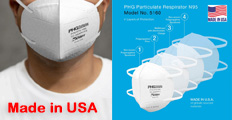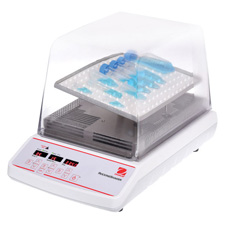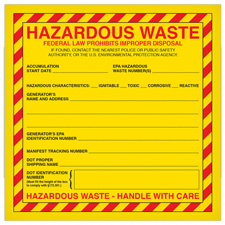



Find all of your laboratory and workplace safety supplies at Safety Emporium!
 Smoke |
 Glossary Index |
 Solution |
| MSDS Topics |
Free Sites | FAQ's | Regulations | Glossary | Software | Suppliers |
| Books | Forum | Poll | Fun stuff | Quiz | Store | |
| Understand your MSDS with the MS-Demystifier | Search ALL our MSDS info | |||||
The solubility of a substance is the maximum amount of a material (called the solute) that can be dissolved in given quantity of specified solvent at a given temperature. When a solute is dissolved in a solvent to give a homogeneous mixture, one has a solution.
Solubility is generally expressed as the number of grams of solute in one liter of saturated solution. For example, solubility in water might be reported as 12 g/L at 25 oC.
Molar solubility is the number of moles of solute in one liter of saturated solution. For example, 0.115 mol/L at 25 oC.

Safety Emporium has all kinds of lab equipment such as this incubating rocking shakers and more.
For about 95% of all compounds, solubility in water increases with increasing temperature. Many compounds can have their solubility in water increased or decreased by the presence of another solute.
Solubilities can be broken into four general classes:
Sparingly soluble materials have very low solubilities such as 0.5 g per liter or (much) lower.
When discussing the solubility of one liquid in another, two additional terms are sometimes used:
The chemical basis for why some materials are soluble in each other while others are insoluble is beyond the scope of this text. See Further Reading below for some good General Chemistry explanations.
NOTE: We may collect a share of sales or other compensation from the links in the following list:
If known, the solubility of a substance will be found on Section 9 (physical and chemical properties) of a Safety Data Sheet. Knowing the solubility of a material can help you know if it may contaminate waste water, what the concentration of a solution may be, how much material will dissolve in a given volume of water, and much more. Solubilities are very handy and versatile.

Bzzzt: Some folks have reported seeing terms like "WATER -Z26020" or "WATER -Z1076" on ancient versions of Sigma Chemical data sheets. These were the result of a computer coding error. Contact the manufacturer directly to get a revised/updated sheet or report the problem.

Get your hazardous waste labels from Safety Emporium.
See also: Concentration units, mole, solvent.
Additional definitions from Google and OneLook.
Entry last updated: Monday, January 16, 2023. This page is copyright 2000-2025 by ILPI. Unauthorized duplication or posting on other web sites is expressly prohibited. Send suggestions, comments, and new entry desires (include the URL if applicable) to us by email.
Disclaimer: The information contained herein is believed to be true and accurate, however ILPI makes no guarantees concerning the veracity of any statement. Use of any information on this page is at the reader's own risk. ILPI strongly encourages the reader to consult the appropriate local, state and federal agencies concerning the matters discussed herein.